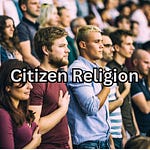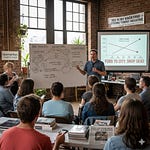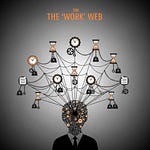The profound desire for change is precisely why we must pivot from the old models of social help—namely, the Non-Profit Industrial Complex (NPIC)—to a genuine, community-led system of Universal Basic Services (UBS).
The NPIC: A Quagmire of Intention 😠
The NPIC is where organizations are assigned to work on the symptoms within our society, rather than addressing the root causes. While concentrating on the symptoms is necessary to create a “buffer”, we become so consumed in the immediate needs that we never reach the root cause. The structure of the NPIC actively ensures this failure:
The Problem is the Model: The ultimate goal for a service organization should be to plan for obsolescence. Instead, non-profits spend the vast majority of their time trying to raise funding to ensure their existence.
Docility for Survival: This financial reliance creates a dependency. Organizations worry about their existence, forcing them to stay docile and avoid the social transformation that is actually required.
The Donor’s Deflection: Benefactors (government, business, and foundations) use their giving—which is often a minuscule amount of their funds—to camouflage how they acquired that money in the first place.
The Chewing Gum Dilemma: My personal experience affirms this. Often, I have encountered gatekeepers who view uncompensated volunteer work as a threat or who offer meager, conditional support that feels like breaking a piece of chewing gum in half and expecting the piece back within 30 minutes!
UBS: Sufficiency, Abundance, and Agency 🤲
Is there a better way? Universal Basic Services (UBS), managed directly by community members, are money-free and transaction-averse.
From Transaction to Abundance: The core concept is simple: if half a sandwich is enough for me, I can afford to give the rest to someone in need. This is based on abundance (having more than enough) and reciprocity.
Money-Free Sufficiency: The real problem isn’t a lack of money; it’s that people are not given the means to meet sufficiency (having enough). UBS works on managing the components of sufficiency for as many people as possible.
Decentralized Democracy: These services are performed locally and democratically. Groups are not managed centrally, but are organized freely by people who feel empowered to act within their own community.
The Power of Open Source: All activities are flexible and open source. This transparency and freedom allow people to participate without obligation, foster a sense of collective ownership, and build measurable social value.
We need to develop an alternative system that demonstrates the current system’s irrelevance. The power of this change is already visible in places like the totally voluntary Language Café in Vienna, which is packed with people sharing knowledge and relishing in the fact that we are together.
80 Mutual Aid Activities: The UBS Blueprint for Change ✨
The following comprehensive list details 80 different mutual aid activities that embody the principles of UBS—building a non-market, anti-charity, community-driven social safety net.
I. Food, Consumption, & Repair
Community Fridges/Pantries (Foodsharing)
Meal Trains/Cooking Collectives
Tool Libraries/Libraries of Things
Community Gardens/Urban Farming
Seed and Plant Swaps/Libraries
Free Stores/Clothing Swaps
Composting Collectives
Wild Edibles and Foraging Education
Zero-Waste/Refill Stations
Furniture & Household Goods Banks
Mending/Clothing Repair Workshops
Donating Doubled Meals
II. Housing & Anti-Displacement
Tenant Unions (Renters’ Organizing)
Rent/Eviction Defense Funds
Community Land Trusts (CLTs)
Mutual-Aid Housing Cooperatives
Limited-Equity Cooperatives (LECs)
Home Repair & Maintenance Collectives
Disaster Housing Relocation
Transitional Host Homes
Tenant Screening Support
Utility Bill Solidarity
DIY Shelter Building
Blight/Disrepair Accountability
Land Reclamation/Squatting Support
Self-Build/Sweat Equity Housing
III. Health, Wellness, & Safety
Street Medic Teams (Urban First Aid)
Peer-to-Peer Mental Health Support
Needle Exchange/Harm Reduction
Period/Menstrual Equity Projects
Grief and End-of-Life Care (Death Doula Collectives)
Sick Care/Wellness Checks
Community Defense Training
Street Safety Patrols (Cop Watch)
Grooming Services (Free Haircuts)
Veterinary Care/Pet Food Banks
Accessibility Audits & Ramp Building
Post-Arrest Support
Public Health Education & Testing
Water/Hydration Stations
Mobile Hygiene Units (Showers/Toilets)
IV. Skills, Education, & Technology
Skillshare Workshops
Language Cafés/Exchange
Tech Access/Repair
Transcription/Documentation Services
Art/Media Literacy Workshops
Free Bike Repair and Tune-Ups
Community Data and Research
Co-working/Third Spaces
Creative Writing/Poetry Groups
Collective Skill Certification
Student Resource Solidarity
Community Mapping/Resource Directories
Digital Solidarity (IT Support)
Zine and Pamphlet Creation
V. Environment & Climate Resilience
Air Quality Monitoring Networks
Solar/Green Energy Sharing
Micro-Forest/Urban Reforestation
E-Waste & Battery Recycling Drives
Invasive Species Removal
Water Conservation Collectives
Emergency Cooling/Warming Shelters
DIY Home Retrofit/Repair
Natural Lawn Care Collectives
Coastal/Waterway Cleanups
Disaster Supply Stockpiling
Bio-Remediation Projects
Community Power Advocacy
Rainwater Harvesting Systems
VI. Social & Political Solidarity
Childcare Collectives/Swaps
Childcare for Activists/Organizers
Prisoner Support/Letter Writing
Post-Incarceration Re-Entry Support
Immigrant Solidarity and Welcome Kits
Document Translation Services
Gender-Affirming Care Funds
Collective Debt/Medical Bill Forgiveness
Tenant/Worker Unionization Support
Buy Nothing Groups (Neighbor-to-Neighbor Gifting)
The edge, it seems, is no longer where we thought it was. It’s in the uncomfortable space where humanity meets ideology, and where the yearning for transformation trumps all else. Let’s build that change together. 🌍🤝











